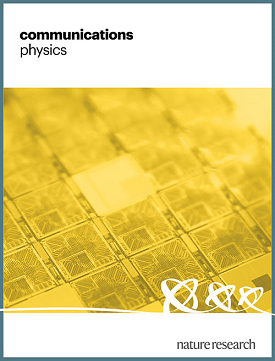Purification scheduling control for throughput maximization in quantum networks
IF 5.8
1区 物理与天体物理
Q1 PHYSICS, MULTIDISCIPLINARY
引用次数: 0
Abstract
Quantum networks can establish End-to-End (E2E) entanglement connections between two arbitrary nodes with desired entanglement fidelity by performing entanglement purification to support quantum applications reliably. The existing works mainly focus on link-level purification scheduling and lack consideration of purifications at network-level, which fails to offer an effective solution for concurrent requests, resulting in low throughput. However, efficiently allocating scarce resources to purify entanglement for concurrent requests remains a critical but unsolved problem. To address this problem, we explore the purification resource scheduling problem from a network-level perspective. We analyze the cost of purification, design the E2E fidelity calculation method in detail, and propose an approach called Purification Scheduling Control (PSC). The basic idea of PSC is to determine the appropriate purification through jointly optimizing purification and resource allocation processes based on conflict avoidance. We conduct extensive experiments that show that PSC can maximize throughput under the fidelity requirement. In quantum networks, entanglement purification is required to ensure that the E2E fidelity of the entanglement connections can support quantum applications reliably. Here, the authors explore the purification resource scheduling problem from a network-level perspective by jointly optimizing purification and resource allocation processes to maximize the throughput under the fidelity requirement.


实现量子网络吞吐量最大化的净化调度控制
量子网络可以通过执行纠缠净化,在两个任意节点之间建立端到端(E2E)纠缠连接,并达到所需的纠缠保真度,从而可靠地支持量子应用。现有研究主要关注链路级净化调度,缺乏对网络级净化的考虑,无法为并发请求提供有效的解决方案,导致吞吐量较低。然而,有效分配稀缺资源以净化并发请求的纠缠仍是一个关键但尚未解决的问题。为了解决这个问题,我们从网络层面的角度探讨了净化资源调度问题。我们分析了净化的成本,详细设计了 E2E 保真度计算方法,并提出了一种称为净化调度控制(PSC)的方法。PSC 的基本思想是在避免冲突的基础上,通过联合优化净化和资源分配过程来确定适当的净化。我们进行了大量实验,结果表明 PSC 可以在保真度要求下最大限度地提高吞吐量。
本文章由计算机程序翻译,如有差异,请以英文原文为准。
求助全文
约1分钟内获得全文
求助全文
来源期刊

Communications Physics
Physics and Astronomy-General Physics and Astronomy
CiteScore
8.40
自引率
3.60%
发文量
276
审稿时长
13 weeks
期刊介绍:
Communications Physics is an open access journal from Nature Research publishing high-quality research, reviews and commentary in all areas of the physical sciences. Research papers published by the journal represent significant advances bringing new insight to a specialized area of research in physics. We also aim to provide a community forum for issues of importance to all physicists, regardless of sub-discipline.
The scope of the journal covers all areas of experimental, applied, fundamental, and interdisciplinary physical sciences. Primary research published in Communications Physics includes novel experimental results, new techniques or computational methods that may influence the work of others in the sub-discipline. We also consider submissions from adjacent research fields where the central advance of the study is of interest to physicists, for example material sciences, physical chemistry and technologies.
 求助内容:
求助内容: 应助结果提醒方式:
应助结果提醒方式:


